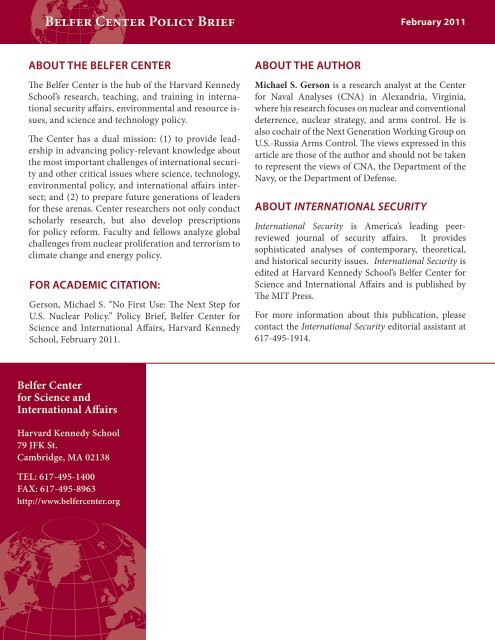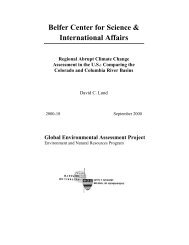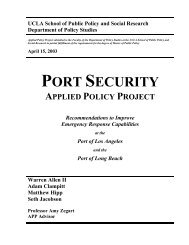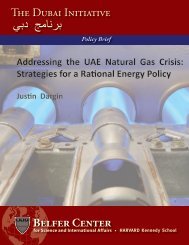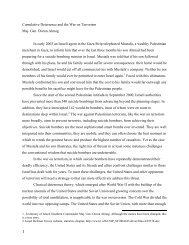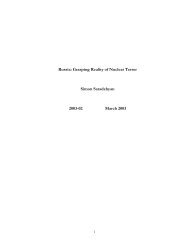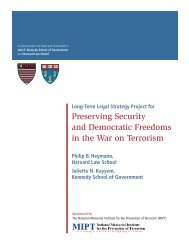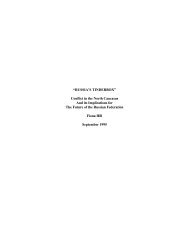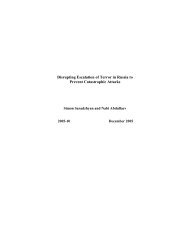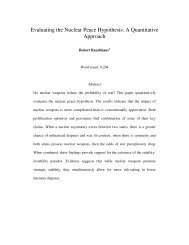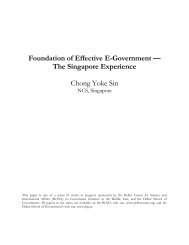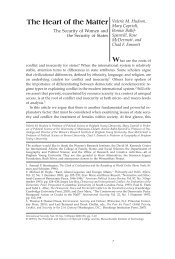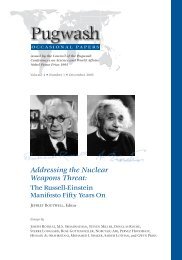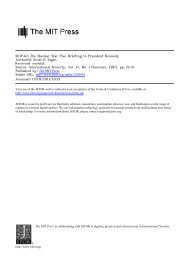The Future of U.S. Nuclear Policy: The Case for No First Use
The Future of U.S. Nuclear Policy: The Case for No First Use
The Future of U.S. Nuclear Policy: The Case for No First Use
Create successful ePaper yourself
Turn your PDF publications into a flip-book with our unique Google optimized e-Paper software.
ABOUT THE BELFER CENTER<br />
<strong>The</strong> Belfer Center is the hub <strong>of</strong> the Harvard Kennedy<br />
School’s research, teaching, and training in international<br />
security affairs, environmental and resource issues,<br />
and science and technology policy.<br />
<strong>The</strong> Center has a dual mission: (1) to provide leadership<br />
in advancing policy-relevant knowledge about<br />
the most important challenges <strong>of</strong> international security<br />
and other critical issues where science, technology,<br />
environmental policy, and international affairs intersect;<br />
and (2) to prepare future generations <strong>of</strong> leaders<br />
<strong>for</strong> these arenas. Center researchers not only conduct<br />
scholarly research, but also develop prescriptions<br />
<strong>for</strong> policy re<strong>for</strong>m. Faculty and fellows analyze global<br />
challenges from nuclear proliferation and terrorism to<br />
climate change and energy policy.<br />
FOR ACADEMIC CITATION:<br />
Gerson, Michael S. “<strong>No</strong> <strong>First</strong> <strong>Use</strong>: <strong>The</strong> Next Step <strong>for</strong><br />
U.S. <strong>Nuclear</strong> <strong>Policy</strong>.” <strong>Policy</strong> Brief, Belfer Center <strong>for</strong><br />
Science and International Affairs, Harvard Kennedy<br />
School, February 2011.<br />
ABOUT THE AUTHOR<br />
Michael S. Gerson is a research analyst at the Center<br />
<strong>for</strong> Naval Analyses (CNA) in Alexandria, Virginia,<br />
where his research focuses on nuclear and conventional<br />
deterrence, nuclear strategy, and arms control. He is<br />
also cochair <strong>of</strong> the Next Generation Working Group on<br />
U.S.-Russia Arms Control. <strong>The</strong> views expressed in this<br />
article are those <strong>of</strong> the author and should not be taken<br />
to represent the views <strong>of</strong> CNA, the Department <strong>of</strong> the<br />
Navy, or the Department <strong>of</strong> Defense.<br />
ABOUT INTERNATIONAL SECURITY<br />
February 2011<br />
International Security is America’s leading peerreviewed<br />
journal <strong>of</strong> security affairs. It provides<br />
sophisticated analyses <strong>of</strong> contemporary, theoretical,<br />
and historical security issues. International Security is<br />
edited at Harvard Kennedy School’s Belfer Center <strong>for</strong><br />
Science and International Affairs and is published by<br />
<strong>The</strong> MIT Press.<br />
For more in<strong>for</strong>mation about this publication, please<br />
contact the International Security editorial assistant at<br />
617-495-1914.


